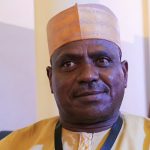In its 2021 Second Quarter report released in December 2021, the Nigerian Electricity Regulatory Commission (NERC), put the number of unmetered power users across the country at about 6.3 million. Daily Trust reports that one of Nigeria’s biggest challenges in the electricity sector centres around the estimated billing system where consumers are charged for energy consumed based on an estimation of their previous usage.
However, in a bid to tackle this problem and close the metering gap, the Federal Government in 2020, introduced the National Mass Metering Policy (NMMP), financed by the Central Bank of Nigeria. The NMMP which is being executed in phases 0 and 1 is aimed at seeing about five million Nigerians metered; ostensibly closing a large chunk of the metering gap.
According to NERC, about 980,000 Nigerians were metered in phase 0 which was flagged off by the Federal Government in 2020. It is expected that phase 1 which will commence in the first quarter of 2022 will see about four million meters installed across the country.
Electricity experts say meters give customer satisfaction because customers pay for what they consume. “Meter is about energy accountability and customer satisfaction,” says the President, Nigeria Consumer Protection Network, Mr. Kunle Olubiyu who further explained that metering is key to growing Nigeria’s electricity sector.
This explains the growing number of local meters manufacturing companies, working with distribution companies to bridge the metering gap. In northern Nigeria, there are few metering companies but one of the leading companies is Smart Meters Company Ltd, located at Maraban Jos in Kaduna State. The Kaduna based company was registered with CAC in 2018 to manufacture and produce single and three phase meters, transformers and other similar electrical appliances.
The company which commenced operation at the peak of the COVID- 19 pandemic had in 2020 signed an MoU with Chint; a Chinese based International metering company that produces about 21billion meters annually. Chint which also has presence in about 70 countries including Nigeria provides the company with SKDs; which are the components of the meters and technical support and the machineries.
Speaking with Daily Trust, the Managing Director of the company, Malam Ibrahim Babagana said in 2020, at the peak of Covid-19 restrictions, the company had ordered for its take-off equipment by air and had immediately constituted a technical team to start operation. “We started interviewing staff, our technical team assessed and determined that our CKD’s were broken into 10 component parts and drew up our fore-plan,” he said.
As the man piloting the affairs of one of northern Nigeria’s ambitious metering companies, Babagana said with about 13 staff and eight contract staff from the local community, the Smart Meters Company took up the challenge to kickstart without a single Chinese technical team. He said due to the pandemic restrictions of travel, the company had jettisoned its earlier plan to bring in expatriates who were to lead the technical team. They had instead, improvised by using three Nigerian local engineers who till today, form the core of the technical team. “It is this particular team that installed all our machines, especially our test benchers; the calibration reading machines. And for me, that was a major discovery, that if we look inwards, we have competent Nigerians, all they need is the right atmosphere.”
As president of the Meters Manufacturers Association of Nigeria, Babagana explained that with the opportunity provided by the Federal Government to finance meters, other metering companies are springing up across the country including the north. “Another meter factory has emerged in Kaduna and there are one or two in Abuja.
However, most of the meter companies are in the southern part of the country,” he said. Ready to seize the opportunities provided by the national mass metering programme, Smart Meters company says it has participated in the bidding process and has the capacity to produce 1.5million meters in two shifts; broken into about 700,000 meters per shift. However, since it officially kickstarted on October 5th, 2020, the company has sold about 50,000 meters through the Meter Assets Providers (MAP) for Kaduna and Kano Distribution Companies.
President of Nigeria Consumer Protection Network (NCPN), Mr. Kunle Olubiyu explained that Nigeria’s Local Content Act encourages that Nigerians should be given some percentage of procurement and commends the increasing number of meter manufacturers in the country. “If you end up bringing in finished products, we will not develop the local capacity,” he warned. “We are happy meters are being manufactured here, even if it is assembly. But do we maximise the capacity of the meter manufacturing companies, no we are not doing that,” he further argued.
He said most of the local meter companies are not on 33kvlines but on 11kvline which does not usually guarantee supply and stressed that there was energy theft from the point of source that needed to be addressed through metering. “If for instance, energy is being generated, between the interface of generation and transmission, there is supposed to be effective meters. So, the measurement of actual generation that is available needs to be metered.”
The NCPN President challenged meter companies to design and manufacture Maximum Demand meters for industrial customers, stressing that putting industrial customers on estimated billings is a de-service to the intention to grow the industry. Mr. Olubiyu also advised for the need to move from the national mass metering to the Credit Advance Payment for Metering Implementation (CAPMI) for those on R1 and R2 to pay for the meters and be refunded with electricity token.
However, Ibrahim Babagana who retired from the Bureau of Public Enterprises in 2019 said the hurdles in the electricity sector are macro and micro and explained that at the macro level, there is a huge metering gap which he said cannot be resolved by one party but through collaboration between the public and private sector as it is being done. He said for a highly capital-intensive venture that requires a lot of forex, there is a need for a robust policy that will encourage the local substitution of some of the component parts of the meters that are brought in from China. “For instance, the meter box, some companies do it in Nigeria but there is a need to improve on the quality. And even the meter screws, why should we bring this from China?” he queried.
He said at Smart Meters company, the plan is to increase production to about five million meters per annum in the next five years and reach out to all the distribution companies operating in the north. “Another expansion plan is to move into the production of meter boxes and we believe we will be doing some service to the sector by doing that because if you are able to produce your meter boxes here, you will be cutting about 20 percent of the cost. So, there is economic sense in it,” he said.
“This is already on the drawing board, we already have an idea of how we intend to do it but there is only one snag. One of the chemicals needed to ensuring a fire-resistant meter box has to be imported and so, with a policy of government in collaboration with meter manufacturers, we can ensure that that chemical is produced in Nigeria,” he said.

 Join Daily Trust WhatsApp Community For Quick Access To News and Happenings Around You.
Join Daily Trust WhatsApp Community For Quick Access To News and Happenings Around You.


